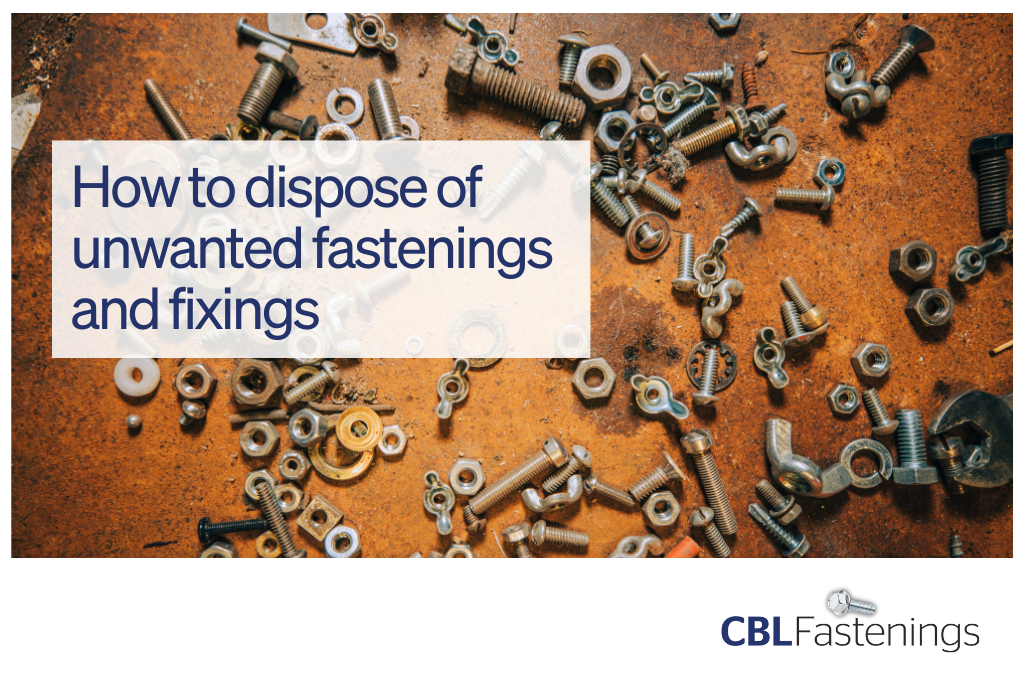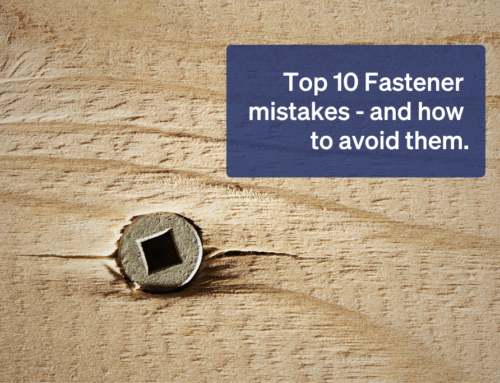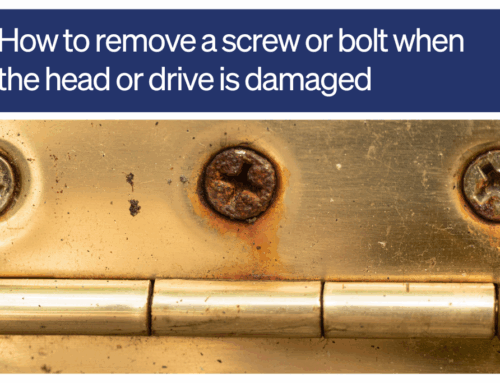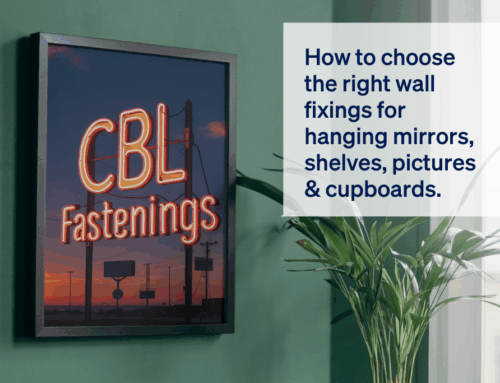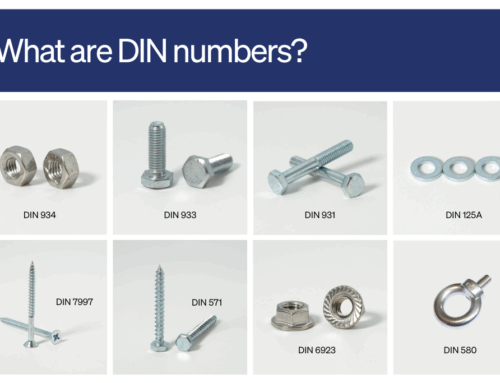If you’ve been contemplating a garage or shed clear out but have no idea what to do with the half-used boxes of screws or nails, then hopefully this article will help. Whether you’re clearing out a toolbox, decluttering a workshop, or finishing a DIY project, you may find yourself with an assortment of unwanted fastenings and fixings which can accumulate over time. These items including screws, nails, bolts, washers, and wall plugs, may seem small, but disposing of them responsibly is essential to reducing waste and promoting recycling. This guide will outline how to properly dispose of these materials on both a small and large scale across the UK.
Can Fastenings and Fixings Be Recycled?
Short answer is yes! But you’ll need to sort them first. Most metal fastenings and fixings, such as screws, nails, and bolts, are made from materials like steel, aluminium, or brass, which are recyclable. However, plastic components such as rawl plugs and nylon washers can be more challenging to recycle through standard household collections. It’s important to check with your local council whether they accept small metal items in kerbside recycling and what type of plastics can be recycled.
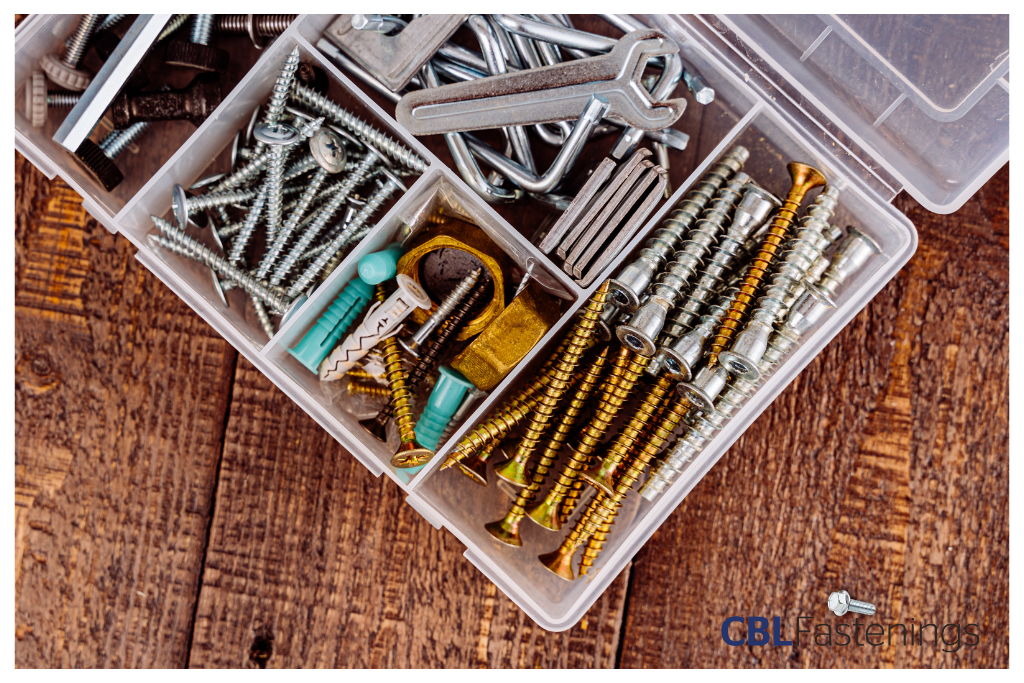
Prepare for recycling
Before you dispose of or recycle screws and nails, it’s important to prepare them properly. This involves sorting and cleaning.
Separate ferrous metals, which are magnetic, like iron and steel from non-ferrous metals, like copper, aluminium, and brass, which are not magnetic.
Buy a large magnet from your local hardware store and if you’re planning on keeping some fastenings then a storage box is also useful.
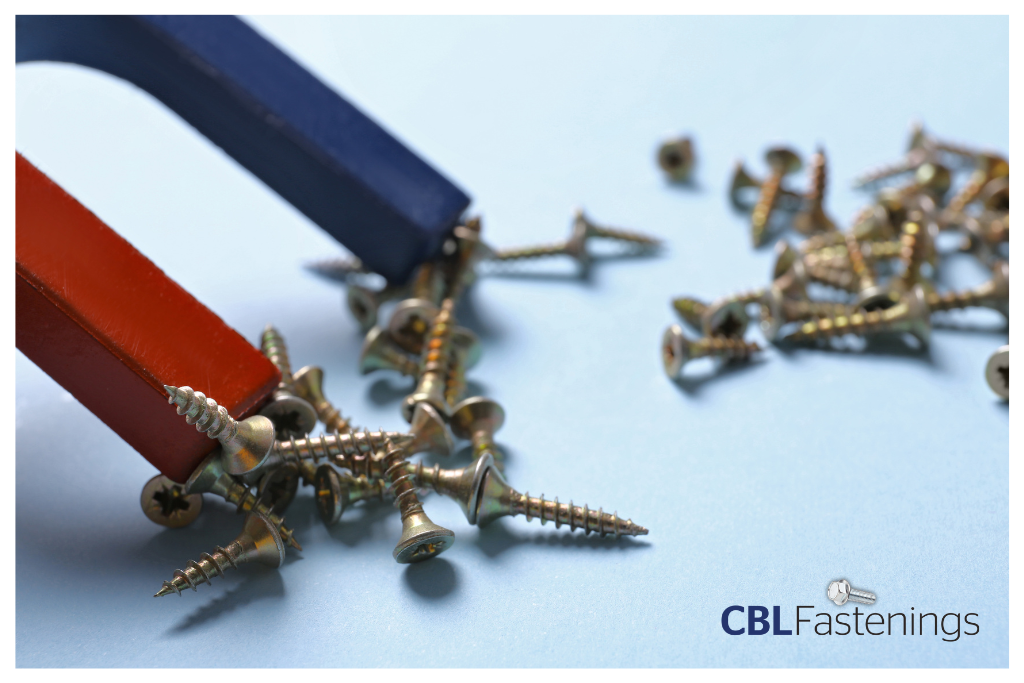
Ferrous Metals
(Contain Iron, Magnetic, Prone to Rust)
- Cast Iron
- Wrought Iron
- Carbon Steel
- Stainless Steel
- Mild Steel
- High-Speed Steel (HSS)
- Tool Steel
Non-Ferrous Metals
(Do Not Contain Iron, Non-Magnetic, More Corrosion-Resistant)
- Aluminum
- Copper
- Brass (Copper + Zinc)
- Bronze (Copper + Tin)
- Lead
- Zinc
- Tin
- Nickel
- Titanium
- Gold
- Silver
- Platinum
- Magnesium
Household Disposal Options
For individuals looking to dispose of small amounts of unwanted fastenings and fixings, here are some options:
1. Household Recycling: Some councils allow small metal objects in household recycling bins. However, due to their size, they might not always be collected efficiently. Placing them inside a metal can (such as a food tin) before disposal can prevent them from getting lost in the sorting process. Some councils suggest leaving smaller recyclable items on top of the bin.
What Shouldn’t Go in the Recycling Bin?
Mixed Materials: Items that combine metal and plastic, such as some wall plugs with embedded screws, may not be recyclable through standard methods.
Rusty or Coated Fastenings: Some treated or heavily rusted fastenings might not be accepted in standard recycling streams.
Large Quantities in Household Bins: Large amounts of fixings should be taken to recycling centres or scrap metal facilities rather than placed in household recycling bins.
2. Household Recycling Centres (HRCs): Many local recycling centres accept scrap metal, including small fixings. Check your local council’s website to find the nearest facility that accepts these items. Here are some household recycling sites that may be close to you: Hailsham Household Waste Recycling Site Eastbourne Household Waste Recycling Site
3. Reusing and Repurposing: If the fastenings are in good condition, consider keeping them, sort them into a storage box for future DIY projects, donate them to community workshops, or offer them on online platforms such as Freecycle, Gumtree, or local Facebook groups.
4. Scrap Metal Dealers: If you have a larger quantity of metal fastenings, scrap metal dealers may accept them for recycling, sometimes even offering a small payment. Some scrap metal dealers in East Sussex: Ripleys TK Metals
Large-Scale Disposal for Businesses and Tradespeople
For businesses, tradespeople, or individuals with large amounts of fastenings and fixings to dispose of, consider these options:
- Trade Recycling Services: Many waste management companies offer trade waste services that include metal recycling. Companies such as Biffa, Veolia, and SUEZ can provide collection and recycling options.
- Dedicated Metal Recycling Facilities: Scrap metal yards often accept large quantities of metal fastenings and fixings. Some well-known companies, such as EMR Metal Recycling, have locations across the UK.
- Donation to Community Workshops or Charities: Organisations such as Men’s Sheds, Repair Cafés, and local schools often welcome donations of usable fastenings for woodworking and engineering projects.
- Manufacturer Take-Back Schemes: Some manufacturers and suppliers run recycling or take-back schemes for used or surplus fixings. Check with your supplier to see if this is an option.
What Shouldn’t Go in the Recycling Bin?
- Mixed Materials: Items that combine metal and plastic, such as some wall plugs with embedded screws, may not be recyclable through standard methods.
- Rusty or Coated Fastenings: Some treated or heavily rusted fastenings might not be accepted in standard recycling streams.
- Large Quantities in Household Bins: Large amounts of fixings should be taken to recycling centres or scrap metal facilities rather than placed in household recycling bins.
Conclusion
Disposing of unwanted fastenings and fixings in the UK requires careful consideration, especially when looking to recycle responsibly. Whether you’re an individual with a handful of spare screws or a tradesperson managing larger quantities, there are numerous ways to ensure these items are reused or recycled properly. By utilising local recycling centres, scrap metal dealers, trade services, and donation options, you can prevent unnecessary waste and contribute to a more sustainable environment. Alternatively drop a bag in to CBL Fastenings and we can help to recycle or re-purpose your unwanted fastenings.

